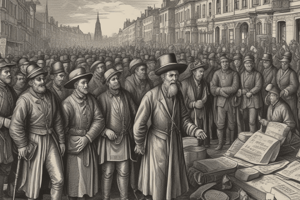Podcast
Questions and Answers
According to the authors, what is the nature of White supremacy in Western societies?
According to the authors, what is the nature of White supremacy in Western societies?
Why do the authors cite Mills and West at the outset?
Why do the authors cite Mills and West at the outset?
What is implied about Western liberal democracies in the context of White supremacy?
What is implied about Western liberal democracies in the context of White supremacy?
What is the significance of the Enlightenment era in the context of White supremacy?
What is the significance of the Enlightenment era in the context of White supremacy?
What is a commonality between Mills, West, and African-centered scholars?
What is a commonality between Mills, West, and African-centered scholars?
What is implied about the role of hate groups in Western societies?
What is implied about the role of hate groups in Western societies?
What is the significance of citing African-centered scholars in the essay?
What is the significance of citing African-centered scholars in the essay?
What is a consequence of White supremacy, according to the authors?
What is a consequence of White supremacy, according to the authors?
What is the tone of the authors' discussion of Western liberal democracies?
What is the tone of the authors' discussion of Western liberal democracies?
What is the relationship between the Enlightenment era and Western thought?
What is the relationship between the Enlightenment era and Western thought?
Who wrote the book 'Black Athena'?
Who wrote the book 'Black Athena'?
What is the title of the book written by William Wells Brown, an American slave?
What is the title of the book written by William Wells Brown, an American slave?
Which historian wrote about the rise of American civilization in a two-volume work?
Which historian wrote about the rise of American civilization in a two-volume work?
What is the title of the journal that published an article by A. Bekerie?
What is the title of the journal that published an article by A. Bekerie?
Who wrote the book 'From Slavery to Freedom'?
Who wrote the book 'From Slavery to Freedom'?
What is the title of the book written by Olaudah Equiano?
What is the title of the book written by Olaudah Equiano?
Who edited the book 'Slave Testimony'?
Who edited the book 'Slave Testimony'?
What is the title of the book written by C. Blockson?
What is the title of the book written by C. Blockson?
Who wrote the book 'Caste, Class and Race'?
Who wrote the book 'Caste, Class and Race'?
Which historian wrote 'How Did American Slavery Begin?'
Which historian wrote 'How Did American Slavery Begin?'
What is a key challenge for antiracism in relation to racial categories and designations?
What is a key challenge for antiracism in relation to racial categories and designations?
How do colonial/colonizing relationships maintain power hierarchies in society?
How do colonial/colonizing relationships maintain power hierarchies in society?
What is a key aspect of critical antiracist practice?
What is a key aspect of critical antiracist practice?
What is the significance of exposing power hierarchies in social relations structured along race and difference?
What is the significance of exposing power hierarchies in social relations structured along race and difference?
What is implied about the relationship between race and social power?
What is implied about the relationship between race and social power?
What is the goal of antiracism in relation to racial designations?
What is the goal of antiracism in relation to racial designations?
How does antiracism approach the intersections of race and other forms of difference?
How does antiracism approach the intersections of race and other forms of difference?
What is implied about the nature of social power imbalances?
What is implied about the nature of social power imbalances?
What is the significance of understanding race-based power dynamics?
What is the significance of understanding race-based power dynamics?
What is the relationship between antiracism and the globalization of racism?
What is the relationship between antiracism and the globalization of racism?
Study Notes
Intellectual Analysis of Black Culture
- There are three schools of thought in intellectual analysis of Black culture: neoconservative, social democratic radical, and liberal-elite-cultural theorist
- Social democratic radicals draw from European intellectual leftist tradition, including Marx, Marcuse, Foucault, and others
- Scholars like Cornel West, Angela Davis, and Manning Marable adopt a universal "race," class, and gender analysis
- Liberal-elite-cultural theorists, such as Henry Louis Gates and K. Anthony Appiah, produce postmodernist literary theory
Afrocentric/African-centered School of Thought
- Focuses on classical African culture with an emphasis on ancient Egypt/Kemet
- Scholars like Cheikh Anta Diop, Theophile Obenga, Maulana Karenga, and Molefi Asante focus on wresting ancient African civilizations from Eurocentric scholarship
- Molefi Asante is a key African-centered theorist who promotes independence from European epistemology
- Asante responds to Cornel West's criticism, arguing that Black scholars should not fear their own truth and should overcome fear of White cultural domination
Critique of Eurocentric Canon
- African-centered scholars argue that adopting Eurocentric discourse prevents true freedom for Black thinkers
- White supremacy is seen as ingrained in Western thought and society, denying human potential to people of color globally
- It is not confined to outwardly racist societies or "hate group" activity, but is a systemic issue in Western societies since the Enlightenment era
Challenges in Researching Enslaved Africans
- Researching enslaved Africans is challenging due to the lack of records from their perspective, as they were not allowed to possess or use skills for recording their lives.
- Most historical documents are from the perspective of slave owners and those who benefited economically or socially from slave labor.
Bias in Historical Records
- Historical records are inherently biased, reflecting the subjugation of human beings.
- In the post-enslavement period, research focused on the perceived differences between African people and the Anglo population.
Early Attempts to Counter Scholarship
- Early attempts to counter scholarship that defined Africans as "problematic" in White society focused on how Africans in America were similar to persons of European descent.
- This thrust focused on how African people could "fit in" to White society.
Development of African Studies
- The discipline of African Studies was developed to counter the biased scholarship that defined Africans as "problematic".
- Key figures in the development of African Studies include William Leo Hansberry, Molefi Asante, and others.
Important Works in African Studies
- Important works in African Studies include "Afrocentricity: The Theory of Social Change" by Molefi Asante, "Yurugu: An African-Centered Critique of European Cultural Thought and Behavior" by Marimba Ani, and others.
- These works aim to provide an African-centered perspective on history, culture, and society.
Rejecting Fixed Meaning of Racial Designations
- Racial designations do not have fixed meanings and are related to social power imbalances.
- We should acknowledge the relationship between racial designations and social power imbalances without feeling the need to use quotation marks.
Critical Antiracist Work
- Critical antiracist work does not reproduce race and racism but accounts for and opposes race-based power dynamics.
- Antiracist practice is aware of the limits of subjecting the concept of race to neat theoretical discussions that serve to reify racist preconceptions.
- Antiracism works with the complexities of difference and challenges the totalizing pretensions of racial and racist discourses.
Intersectionality
- Antiracism must touch on the intersections of race, gender, class, sexuality, and other forms of difference.
- Black feminist theorists have articulated the importance of exploring intersections of difference.
Saliency of Race
- The concept of saliency of race acknowledges that race is often plainly marked on the body and assumes a stubborn saliency.
- Saliency is not about privileging one form of identity over another, but rather acknowledges skin color as a significant form of difference with respect to societal power distributions.
- Saliency affirms the necessity of a politics of recognition in antiracist practice.
Operationalizing Antiracism
- Antiracism makes local, regional, national, and international connections to create an awareness of the globalization of racism.
- The experiences of racism, colonialism, and imperialism have been manifested on local, regional, and international scales.
Complicating and Naming Race
- Antiracist practice must both "name" and "complicate" race.
- Fixed categories must be troubled as a necessary part of any intellectual exercise purporting to be antiracist.
- Theoretical tools and concepts for the study of race must enable us to expose power hierarchies in social relations structured along race and difference.
Studying That Suits You
Use AI to generate personalized quizzes and flashcards to suit your learning preferences.
Related Documents
Description
Chapter 6: Philosophy and Practice for Black Studies: The Case of Researching White Supremacy Chapter 7: Researching the Lives of the Enslaved: The State of the Scholarship Chapter 8: Antiracism: Theorizing in the Context of Perils and Desires




